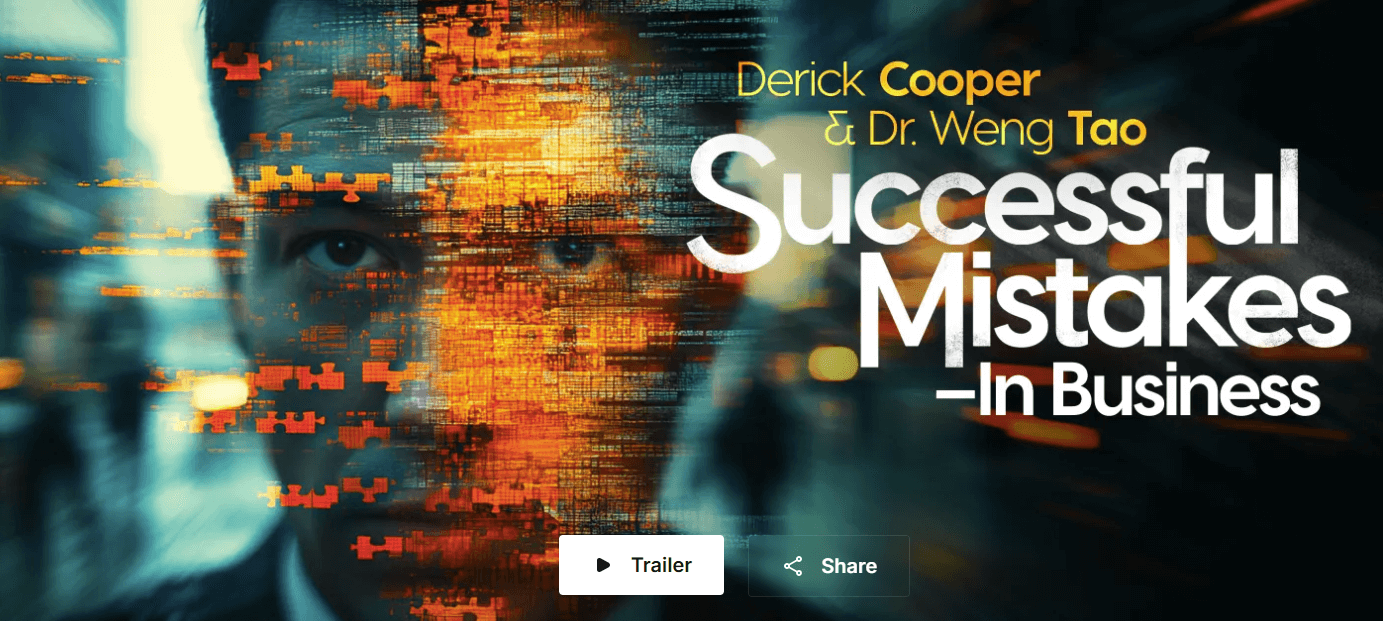🌟 New Year Offer 🌟
Celebrate 2025 with 30% OFF on all products! Use code: NEWYEAR2025. Hurry, offer ends soon!
Explore the principles of effective decision-making, leadership, and the constructive role of mistakes in personal and professional growth.
The course shows how embracing mistakes, fostering open dialogue, and understanding data lead to better outcomes.
File Size: 8.281 GB.
Derick Cooper & Weng Tao – Successful Mistakes In Business

Derick Cooper
Businessman
Dr. Weng Tao
Businesswoman
In Successful Mistakes in Business, an eight-hour course, Derick Cooper and Dr. Weng Tao explore the principles of effective decision-making, leadership, and the constructive role of mistakes in personal and professional growth. The lectures cover key concepts like information processing, statistical analysis, and individual personality traits, highlighting their impact on decision-making. Through real-world examples and expert insights from our instructors, the course shows how embracing mistakes, fostering open dialogue, and understanding data lead to better outcomes. We are encouraged to create a culture of truth-seeking, diverse perspectives, and continuous learning, while underscoring the need for clear communication and self-awareness in leadership.
Lectures
- The Power of Mistakes
In our introductory lecture, Derek Cooper presents the concept of “successful mistakes” and how analyzing errors leads to success. He emphasizes the importance of questioning authority, epistemic humility, and understanding that mistakes are inevitable parts of decision-making rather than something to be avoided. The lecture explores how ego can interfere with learning from mistakes and the importance of creating an environment that encourages open dialogue and constructive questioning.
2. The Growth Mindset
In lecture two, Dr. Weng Tao explores the essential role of mistakes in personal and professional growth, emphasizing how acknowledging and learning from them can lead to success. Drawing on personal experiences, she highlights how perception biases and emotional reactions to mistakes affect decision-making. The lecture concludes by advocating for a growth mindset that normalizes mistakes, fosters open dialogue, and embraces discomfort as a path to success.
3. Information and Decisions
In lecture three, Derick Cooper explains how information processing impacts decision-making through two main aspects: externally curated information and internal cognitive limitations. The discussion emphasizes the importance of distinguishing between genuine experts who can simplify complex concepts and “fakesperts” who rely on jargon to impress. Derick Cooper emphasizes the need for self-awareness, humility, and challenging one’s beliefs in decision-making, highlighting how the desire for consensus can lead to poor choices. He stresses the value of embracing uncomfortable truths and diverse perspectives.
4. Personality and Perception
In lecture four, we explore the Big Five personality traits and their impact on how individuals perceive and interact with the world. The discussion examines how different personality types affect workplace dynamics, communication styles, and relationship building, while emphasizing that understanding these traits can help people better navigate social and professional situations. The lecture emphasizes the importance of self-awareness, setting boundaries, and practicing humility to navigate interpersonal dynamics more effectively.
5. Fundamentals of Statistics I
In lecture five, Derick Cooper delves into the fundamentals of data, probability, and statistics, exploring key concepts such as normal distribution, standard deviation, and z-scores. We examine how these tools can be used to assess and compare data sets, make predictions, and inform decision-making processes. The session emphasizes the importance of understanding the limitations and potential pitfalls of statistical analysis, particularly when dealing with large data sets or complex relationships.
6. Fundamentals of Statistics II
In lecture six, we further explore the complexities of statistical analysis and the risks of misinterpreting or manipulating data. Derick Cooper stresses the need for caution with statistical findings, as even well-intentioned researchers can fall prey to biases or manipulation. The lecture highlights the importance of understanding p-values, t-statistics, and sample sizes, while emphasizing that true experts aim to educate through clear, simplified communication.
7. Creating Resilient Organizations
In lecture seven, Dr. Weng Tao and Derick Cooper demonstrate real-life experiences and lessons learned in leadership and decision-making within an organization. They discuss the importance of fostering an open and honest culture, relying on data to validate decisions, and the challenges of managing personnel changes and regulatory compliance in complex industries. The lecture emphasizes the value of learning from mistakes, building trust, and pursuing truth in order to create a successful and resilient organization.
8. Leading with Integrity
In our eighth and final lecture, Derick Cooper and Dr. Weng Tao discuss the fundamentals of effective decision-making. They emphasize the importance of listening to diverse perspectives, maintaining humility, and being open to new information. They also examine the characteristics of effective leaders, including their ability to maintain integrity, accept responsibility, and create clear organizational priorities while remaining adaptable to change. Ultimately, they highlight the importance of recognizing failure as an opportunity for growth and course correction as we move through our lives.
Course Features
- Lectures 0
- Quizzes 0
- Duration 10 weeks
- Skill level All levels
- Language English
- Students 99
- Assessments Yes








